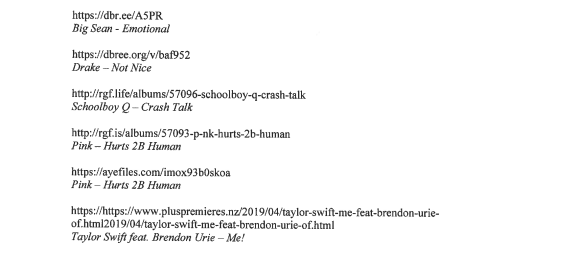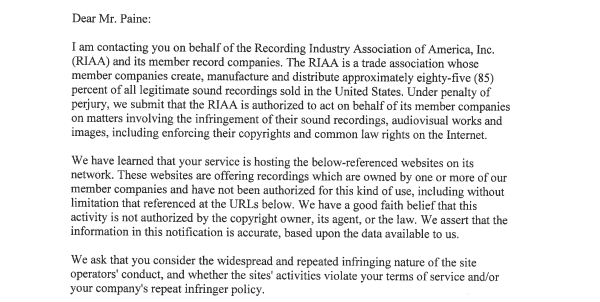RIAA Obtains Subpoena to Expose ‘Infringing’ Cloudflare Users
lundi 6 mai 2019 à 21:28 Despite the increased availability of legal options, millions of people still stream, rip, or download MP3s from unofficial sources.
Despite the increased availability of legal options, millions of people still stream, rip, or download MP3s from unofficial sources.
These sites are a thorn in the side of the RIAA, one of the music industry’s leading anti-piracy outfits.
The RIAA has a long history of going after, what it sees as, pirate sites. The problem, however, is that many owners of such sites operate anonymously. The group, therefore, often has to turn to third-party intermediaries to find out more.
While some services may be willing to voluntarily share information with the music industry group, many don’t. Cloudflare falls into the latter category. While the CDN service does voluntarily reveal the true hosting locations of some of its users, it doesn’t share any personal info. At least, not without a subpoena.
Luckily for rightsholders, getting a subpoena isn’t very hard in the US. Under the DMCA, copyright holders only have to ask a court clerk for a signature to be able to demand the personal information of alleged copyright infringers. That’s exactly what the RIAA did last week.
In a letter sent by Mark McDevitt, the RIAA’s vice president of online anti-piracy, the music group informs Cloudflare that it requests personal details including names, addresses and payment information relating to the operators of six domains, which are all Cloudflare users.

The domains in question include those connected to the file-hosting site DBREE, music release site RapGodFathers, file-host AyeFiles, and music download portal Plus Premieres. The sites are accused of sharing copyrighted tracks from artists such as Pink, Drake, and Taylor Swift.
“We have determined that users of your system or network have infringed our member record companies’ copyrighted sound recordings. Enclosed is a subpoena compliant with the Digital Millennium Copyright Act,” the RIAA’s McDevitt writes.
“As is stated in the attached subpoena, you are required to disclose to the RIAA information sufficient to identify the infringers. This would include the individuals’ names, physical addresses, IP addresses, telephone numbers, e-mail addresses, payment information, account updates and account history.”
The RIAA stresses that the mentioned files are offered without permission and it asks Cloudflare to consider the widespread and repeated infringing nature of the sites and whether these warrant a termination under its repeat infringer policy.

At the time of writing the sites are still using Cloudflare’s services. However, the allegedly infringing files are no longer available. These were presumably removed by the site owners.
There is no obvious connection between all the targeted sites. However, RapGodFathers is a familiar name when it comes to anti-piracy enforcement. Nearly ten years ago, the site was targeted by the U.S. Government, but the name is still around today.
It is unclear what RIAA plans to do with the requested information. It could form the basis of a legal complaint, but the music group may also use it to contact the site operators more directly. The letter only mentions that the information will be used to protect the rights of RIAA member companies.
“The purpose for which this subpoena is sought is to obtain the identities of the individuals assigned to these websites who have reproduced and have offered for distribution our members’ copyrighted sound recordings without their authorization.
“This information will only be used for the purposes of protecting the rights granted to our members, the sound recording copyright owner, under Title II of the Digital Millennium Copyright Act,” the letter adds.
What this “protection” entails remains a mystery for now.
While the court clerk signed the DMCA subpoena, Cloudflare still has the option to object, by asking the court to quash it. However, thus far there are no signs that the company plans to do so.
—
A copy of the letter RIAA sent to Cloudflare, obtained by TorrentFreak, is available here (pdf).
Source: TF, for the latest info on copyright, file-sharing, torrent sites and more. We also have VPN reviews, discounts, offers and coupons.

 This week we have two newcomers in our chart.
This week we have two newcomers in our chart. A few days ago the United States Trade Representative (USTR) published
A few days ago the United States Trade Representative (USTR) published 

